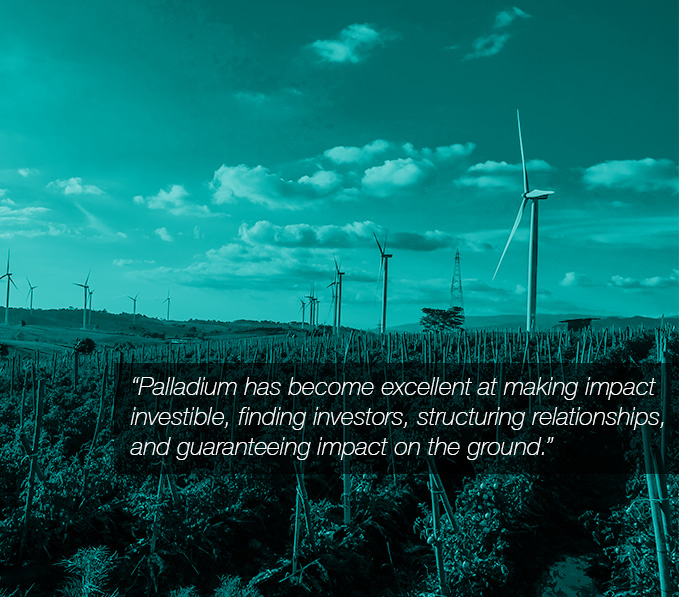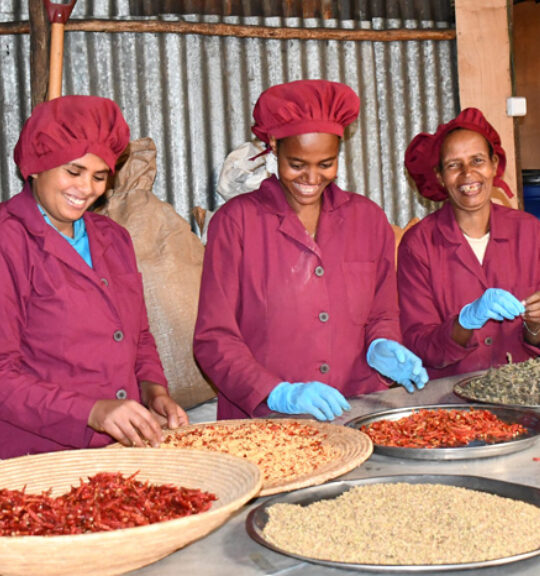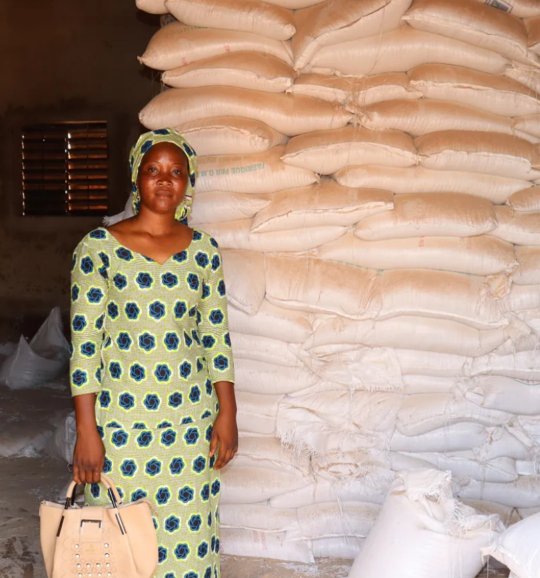Our Impact


The resources exist to tackle every challenge we face without exception. Even the desire exists amongst the many governments, corporations, investors, and philanthropists standing with funds at the ready.
The question of “who’s going to pay” has long been answered, but the “how” isn’t always clear. From philanthropy to core business operations, we need to make saving the world an investible opportunity. We need vehicles, mechanisms, and reporting in place to help funders assess the risks and understand the returns, both in terms of profit and impact.
Palladium has become excellent at making impact investible, finding investors, structuring relationships, and guaranteeing impact on the ground.
That’s what we mean when we talk about “catalysing” investment; it’s the funding that’s been made possible by Palladium’s support. This includes capital mobilised through (1) our donor-funded development projects; (2) our dedicated capital advisory team; and (3) Bamboo Capital Partners, our asset management arm.
In 2023, we mobilised $4.05B of which $1.4B was private investment.
Institutional investors hold over US$100 trillion in assets globally. It’s funding that’s desperately needed to close the financing gap and achieve the UN’s Sustainable Development Goals. But without the right pathways for these assets to unlock new opportunities in developing markets, that funding is lost and the gap remains open.
Government Backing
That’s where Mobilising Institutional Capital Through Listed Products (MOBILIST) steps in to start working. A flagship UK government program, MOBILIST supports investment solutions that help to deliver the Global Goals and support the climate transition. The team uses equity capital, technical assistance, and the UK government’s backing to address barriers and create the environment needed for products to list on public markets and stock exchanges.
This year in Singapore, MOBILIST committed an anchor investment of up to $20.4 million in Bayfront Infrastructure Capital. This anchor investment is critical because it provides security and attracts additional investors, further building a new market, increasing the amount of capital it can deploy and ultimately, the impact it can achieve.
It’s a big picture example that’s hard to fathom in scale and impact, but it’s an example of how public money can be deployed at the commercial level and still provide returns to the taxpayer. The investor appetite is there, but without the right avenues to invest in sectors like sustainable infrastructure, it’s opportunity lost. MOBILIST’s work is critical to pairing public funding with private investment, because it takes the two working together to address our global challenges.
From the large scale to the small, our work mobilising finance only begins with institutional investments. We ensure that small businesses and enterprises have the capital they need to survive and scale up. Small businesses are at the heart of nearly every thriving economy around the globe, and ensuring their survival means the survival of the economy as a whole.
Change Starts with Small Businesses
For CATALYZE, one of USAID’s Private Sector Engagement Hub projects, the focus is on developing commercially viable business models to create jobs, expand sustainable social services, optimise supply chains, and advance inclusive growth in underfinanced social sectors in higher-risk countries. With a goal of mobilising US$2 billion in blended finance by 2027, CATALYZE uses a market development approach so businesses can attract investment and working capital to grow.
In Burkina Faso, where nearly 86% of the working population in the country’s rural areas derive all or part of their income from livestock, there’s an excellent business opportunity for feed sellers. For small business owners within the livestock ecosystem, particularly women, securing finance from banks to bolster their businesses is near impossible. Compounded by the fact that the country is in turmoil, traditional investors see risk in a tough environment, rather than an opportunity to help build a thriving, sustainable economy.
Through CATALYZE’s Finance for Resilience project, which has been working in the country since 2020 and which has already assisted 316 enterprises, small business owners in the agriculture sector can receive loans that otherwise would have been refused. By partnering with local finance institutions, CATALYZE provides incentives for loans offered to young entrepreneurs’ agriculture businesses.
For Aminata Ouedraogo, a young woman who runs a local micro-enterprise selling wheat bran and animal feed and processing peanut oil and flour, support from CATALYZE meant the survival of not just her business but her family. As it is for millions of women in Burkina Faso’s rural areas, Ouedraogo’s access to adequate and timely financial services was limited or non-existent. The loans she was offered consistently fell short of covering the cost of 5 tonnes of wheat needed to kickstart her business’ recovery.
Ouedraogo finally received a loan from a CATALYZE partner financial institution. In less than 2 weeks, her credit application was processed and her ability to purchase wheat bran increased by 20 tonnes. After repaying this first loan a few days ahead of schedule, she applied for a second loan to open a warehouse at the livestock market to store her wheat bran. Thanks to these loans, Ouedraogo’s profits increased by 100%.
Strong economies do not exist in a vacuum and solving our global problems cannot be achieved in a silo. Both require partnerships, sufficient capital, and mechanisms to invest that capital in the businesses, people, and organisations building a better, more just future for us all.
Bamboo Capital Partners
Bamboo is the asset management arm of Palladium’s impact investing business. Over the past 13 years, Bamboo has sourced game-changing companies to address underserved mass markets, helped investees to strengthen their businesses, and in turn, seen an increase of 48,000 jobs and touched 238 million lives.
Bamboo’s flagship platform is the SDG500, a coalition of private and public sector entities accelerating progress towards the UN’s Sustainable Development Goals.





